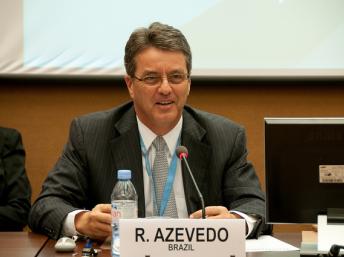
World Trade Organization Director General Roberto Azevedo expressed concern at U.S. President Donald Trump’s plan for tariffs on steel and aluminum on Friday, an extremely rare intervention into a WTO member’s trade policy.
“The WTO is clearly concerned at the announcement of U.S. plans for tariffs on steel and aluminum. The potential for escalation is real, as we have seen from the initial responses of others,” he said in a brief statement issued by the WTO.
“A trade war is in no one’s interests. The WTO will be watching the situation very closely.”
Trump struck a defiant tone on Friday, saying trade wars were good and easy to win, after his plan for 25 percent tariffs on steel imports and 10 percent on aluminum triggered global criticism and a slide in world stock markets.
The plan was criticized in a WTO committee as early as June last year, and has caused an international outcry since Trump confirmed he intended to go ahead this week.
Azevedo, a former Brazilian trade negotiator, is normally extremely diplomatic and refrains from any criticism of any of the WTO’s 164 members, saying it is up to them to use the WTO’s rules and dispute settlement system to work things out.
But Trump’s tariffs plan is widely seen as being a potential threat to the system itself, since they are based on a claim to “national security”, an area that is exempt from WTO rules.
WTO member countries have traditionally refrained from citing national security, out of fear that it could provide a get-out clause from rules that have governed world trade for almost a quarter of a century.
If the use of the national security exception spreads, other potential trade disputes where it could be used include a row over China’s cyber security law and in the economic war between Russia and Ukraine.
A long-time taboo on national security looked like it had been broken last year when Bahrain, Saudi Arabia and United Arab Emirates used it to justify their economic boycott of Qatar.
But the fear of Pandora’s Box being opened was not realized because Qatar has not pressed its a demand for an adjudication panel, effectively leaving its litigation in limbo.
The risk of “national security” becoming a regular defense is only one of several dangers facing the WTO, which has struggled to keep its rules up to date since it was created in 1995.
It is also at risk from a U.S. veto on judicial appointments, which could paralyse its dispute settlement arm.
Copyright Ships & Ports Ltd. Permission to use quotations from this article is granted subject to appropriate credit given to www.shipsandports.com.ng as the source.
